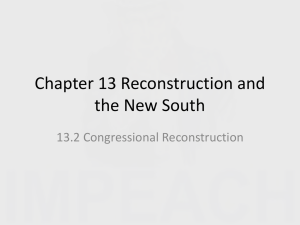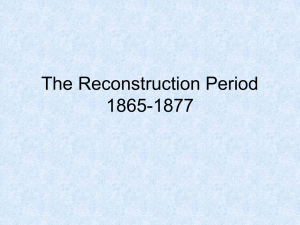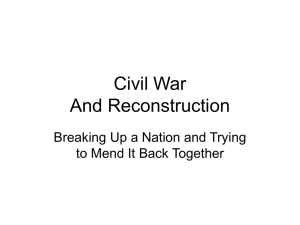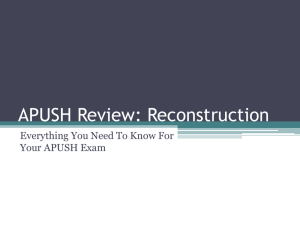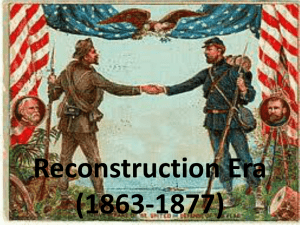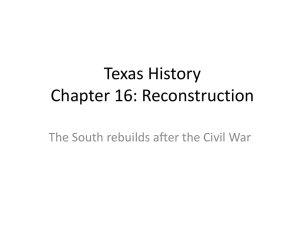Reconstruction and its Effects ! - Williamstown Independent Schools
advertisement
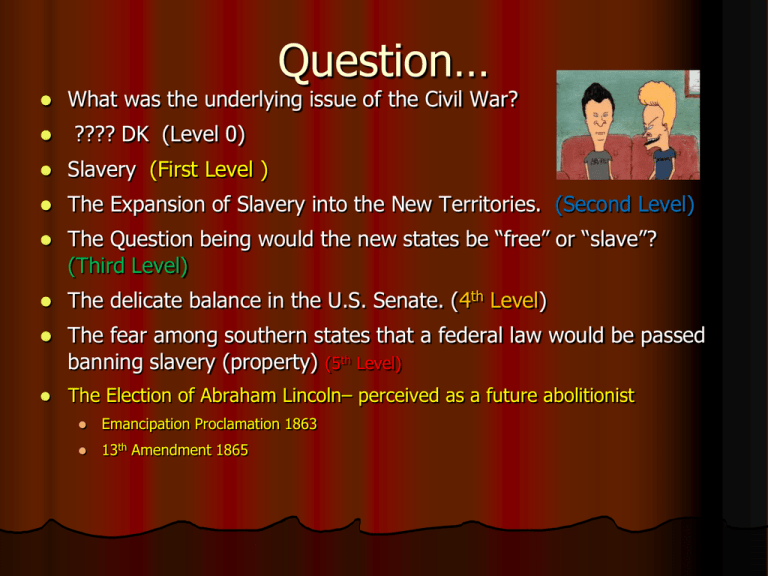
Question… What was the underlying issue of the Civil War? ???? DK (Level 0) Slavery (First Level ) The Expansion of Slavery into the New Territories. (Second Level) The Question being would the new states be “free” or “slave”? (Third Level) The delicate balance in the U.S. Senate. (4th Level) The fear among southern states that a federal law would be passed banning slavery (property) (5th Level) The Election of Abraham Lincoln– perceived as a future abolitionist Emancipation Proclamation 1863 13th Amendment 1865 Reconstruction Describe the basic provisions and immediate impact of the Thirteenth, Fourteenth, and Fifteenth Amendments to the Constitution Evaluate different Reconstruction plans and their social, economic, and political impact on the South and the rest of the United States Analyze the immediate and long-term influences of Reconstruction on the lives of African Americans and U.S. society as a whole Reconstruction and its Effects Central Characters: Andrew Johnson Freed Blacks The Radicals Carpetbaggers Scalawags Ex-Confederates Federal vs. State Authority Post-War Conditions in the South Physical Damage Transportation destroyed 9,000 mi. RR ruined 2/3 of shipping gone thousands of mi. of roads Loss of Property land value dropped 70% lost 1/3 of all livestock equipment rusted/ disrepair B. Human Toll 1. North = 364,000 lives South = 290,000 (20% of all adult white males) 2. Widows & orphans abounded C. Hardships 1. Black Southerners 4 million ex-slaves looked for work, food, clothing, shelter, skills, etc. 2. Planters lost slaves ($3 billion) & private property ($100 million) seized by federal govt. could not afford to hire labor even if they could hang on to their land 3. Poor-Whites faced job competition from freedmen (increased racial conflict) Quiz Q #1 What two issues lay at the heart of Reconstruction? 1. The political and economic power for freed slaves 2. North/South economic and political relations. Political Cartoon: What words come to mind? Example:__________,…. Describe the basic provisions and immediate impact of the Thirteenth, Fourteenth, and Fifteenth Amendments to the Constitution We will….. Analyze the immediate and long-term influences of Reconstruction on the lives of African Americans and U.S. society as a whole Evaluate different Reconstruction plans and their social, economic, and political impact on the South and the rest of the United States 1. What should be done with the those who rebelled against the Union? (former Confederates) We will Evaluate and Create Plans 3 Main 2. How should thefor Southern States be readmitted to the Union? Reconstruction Issues 3. What should be done for Freedmen to achieve political and economic equality? The Politics of Reconstruction What was Reconstruction? The period during which the U.S. began to rebuild after the Civil War. It is the process of bringing the Southern states back into the nation. It lasted from 1865 to 1877. -During the war, Lincoln made a plan for Reconstruction that was lenient, or easy, on the the South. -Lincoln’s plan differed strongly from the Radicals, a group of Republicans who wanted to destroy the political power of former slaveholders. Quiz Q #2 A major reason the Radical Republicans opposed President Abraham Lincoln’s Reconstruction plan was that his plan… Offered amnesty to Confederates who would swear allegiance to the United States After Lincoln died, his vicepresident, Andrew Johnson, became president. -Johnson’s plan was similar to Lincoln’s. Quiz Q #3 President Andrew Johnson’s Reconstruction Plan would have… Made it possible for former high-ranking Confederates to assume positions of power in the reconstructed southern governments. All he required them to do was to ask his pardon (ie. Kiss his foot!) -However, Radical Republicans in Congress thought both plans were too easy on the South. -They wanted to destroy the political power of former slave owners. -They also wanted African Americans to be citizens with the right to vote. - President Johnson, on the other hand, refused to cooperate with Congress….. Quiz Q #4 What brought the Radical and moderate Republicans together in an alliance against President Johnson? The President’s veto of the Freedmen’s Bureau Bill and the Civil Rights Act of 1866. -When the majority of Republicans in Congress united, they won a struggle with the president to control Reconstruction. -When Radical and moderate Republicans united, they now had enough votes to override Johnson’s veto power and passed a law creating the Freedman's Bureau, which gave food and clothing to former slaves and set up hospitals and schools. -Congress also passed the Civil Rights Act of 1866, which said that states could not enact laws that discriminated against African Americans. 14th Amendment -Congress then passed the Fourteenth Amendment which gave African Americans citizenship. -Johnson urged Southern states NOT to ratify it because they had no say in creating it. -Congress angrily responded with the Reconstruction Act of 1867 which stated that NO state could re-enter the Union until it approved the 14th Amendment and gave the vote to black men. The Reconstruction Act of March 2, 1867: The act also divided the South into five military zones, temporarily disfranchised tens of thousands of former Confederates, and laid down new guidelines for the readmission of states (Johnson had announced the Union restored, but Congress had not yet formally agreed on this), not until all of their conditions were met. President Johnson Impeached! -The fight between Congress and Johnson led Congress to look for a way to impeach the president. It wasn’t enough for him to be a powerless lame duck. The Radicals in Congress wanted him to be humiliated and shamed, and ultimately, kicked out of office. -Johnson had removed a cabinet member, and Congress said he did it illegally, thus using this excuse to try to kick him out of the presidency. -Johnson was impeached by the House of Representatives, and went on trial in the Senate. IF found guilty, he would be removed from the presidency………….. But……… ……….when the final votes came in, President Johnson was NOT Convicted in the Senate but by a single vote! Regardless, Johnson served the remainder of his term as a powerless lame duck, and Congress ran the country. 15th Amendment -In 1868, Civil War hero Ulysses S. Grant was elected and became president. -African American votes in the South helped him win. -Then in 1870, the Fifteenth Amendment was ratified which banned states from denying the vote to black men. Ulysses S. Grant Reconstructing Society -By 1870 all former Confederates states were back in a union. -Their governments were run by Republicans. -The South faced terrible economic conditions. -Many men had died in the war, people had lost their investments, farms were ruined................ Sherman's March to the Sea A New Beginning....? -The new Republican state governments in the South began public works programs to repair the physical damage to the cities and landscape. -They also provided social services to provide food, clothing, shelter, and education. They raised taxes to pay for these programs. -Three groups of Southern Republicans had different goals: -Scalawags were white southerners. They were small farmers who did not want wealthy planters to regain power, so they cooperated with the Northern controlled Republican Southern stated governments. Other southerners saw them as traitors of the Old South. -Carpetbaggers were Northerners who had moved South to take advantage of rebuilding the South for profit. -Black men had voting rights for the first time and voted Republican, but many white Southerners resisted equality for African Americans. -During Reconstruction, many former slaves moved to the cities, and with help they organized schools and churches. -Many voted, and some were elected to the highest offices in the United States government........Hiram Revels was the first African American senator. Hiram Revels Promises Unkept........ -Freed African Americans wanted to farm their own land and had been promised “40 acres and a mule” by General Sherman, though Congress did NOT honor this promise. -Meanwhile, the old Southern planters wanted to return to the plantation system. -They tried to make sure that the former slaves could NOT own land, and that they would remain at the very least, 2nd class citizens, so….. Sharecropping & Tenant Farming -To survive, many former slaves became sharecroppers, which is a system in which landowners give a few acres of land to their farm workers. -The “croppers” keep a small portion of their crops and give the rest to their landowners. Another system that allowed whites to control the labor of former slaves was tenant farming. Tenant farmers rented land from the landowners for cash. Quiz Q #5 In the years after the Civil War, most freedmen ended up working as… Farmers under a sharecropper system. The Collapse of Reconstruction What gains of Reconstruction were undone by 1877, only 12 years after the Civil War was over? -Racist southern whites did not like the freed slaves voting, so some formed secret groups such as the Ku Klux Klan (KKK) that used violence to keep blacks from voting. Black Codes and other Laws in the Post Reconstruction Era Vagrancy Laws: Black Codes (Jim Crow Laws) Segregation “ Separate But Equal” Grandfather Clause Literacy Tests Poll Taxes -In response to groups such as the KKK, Congress passed the Enforcement Acts under President Grant to stop the violence, and, in effect, the KKK essentially went into hiding as federal troops began to hunt them down. -However, Congress also gave the vote to many former Confederates. -As a result, Southern Democrats began to regain power........... -Other less extreme whites refused to hire blacks that voted. Why did Reconstruction fail to solve the racism issue in the United States? -An economic depression occurred during the Panic of 1873, which severely cut funds away from Reconstruction programs. -As a result, the Northern states grew tired of attempting to pay for the rebuilding of the South – and, ultimately, the assimilation of the freed slaves into normal society. Also, President Grant became increasingly unpopular as his administration was corrupt with several scandals….. Quiz Q #6 Why did Ulysses S. Grant’s popularity decline substantially by the end of his presidency? The corruption evident in his administration. The “Compromise of 1876” -In 1876, there was a disputed presidential election that led to the end of Reconstruction. -Even though the Democratic candidate had seemingly won the election, the Democrats agreed to accept the Republican candidate, Rutherford B. Hayes, as President in return for the withdrawal of federal troops from the South. Quiz Q #7 The “Compromise of 1877” did which of the following? Ended federal military support of Republican administrations in the South. SO......... ..... without federal troops, there was no one to stop hate groups, such as the Klan, from returning to intimidate blacks from voting. Thus, the Southern Democrats regained control of the state legislatures, and most things went back to largely the same way it was before the Civil War began. The new state Southern Democratic legislatures quickly began passing socalled “Jim Crow” Laws – discriminatory laws that would ensure that whites and blacks would be kept separate. - Blacks once again began to be treated like 2nd-class citizens, and it would take almost another 100 years – until the 1950s - with the beginning of the Civil Rights Movement – before justice would once again come to African American citizens....and this time for real. Quiz Q #8 After the passage of the 13th, 14th, and 15th Amendments, the black population continued to experience political and economic oppression mainly because… -Southern legislatures enacted Jim Crow Laws What advancements have African Americans made since Reconstruction? Reconstruction continued 3. Reconstruction Video and Questions (Page 4 in Packet) 4. Reconstruction Plan: Grade and Answer each question in 1-2 Complete Sentences. 5. My Reconstruction Plan (Handout)

